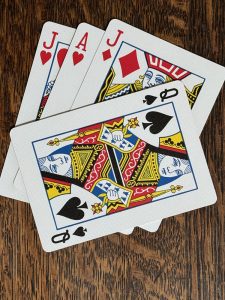 I never learned to be much of a poker player. In school the game we played during lunch periods or at other odd free times was spades, about which I remember very little. No matter. Another game sticks much more in my memory, and it’s one that I still play on occasion with family and friends: hearts.
I never learned to be much of a poker player. In school the game we played during lunch periods or at other odd free times was spades, about which I remember very little. No matter. Another game sticks much more in my memory, and it’s one that I still play on occasion with family and friends: hearts.
It was my mother who was the prime instigator of this game. She had been brought up to go on no extended trip without a deck of cards, or two, and even though she had learned to play bridge as well, hearts was the game she chose to shuffle into our family’s game time. Because we played a number of board games at home, this usually meant that our most frequent and intense hearts games occurred when we were on some road trip or other, on our way to visit relatives or national parks or other sites of historical or scenic interest: the Wisconsin Dells, the Ozarks, Mammoth Cave, the Upper Peninsula of Michigan.
For those not familiar, hearts is a lower-case-t trump game in which the goal is to avoid scoring points, which mostly accrue when you end up with heart cards in a hand that you have just won. You win a hand by playing the highest card in whatever suit has been played first. This is often no problem in the early rounds, when most players have diamonds or spades or clubs in their hand: taking these hands is harmless, no points scored, no damage done. But then comes a hand when some player who lacks a card in the suit played first decides to drop a heart in. That’s a point against whoever has to take the hand. And from there on the strategizing grows intense: how high a trump card do I dare play? Do I take the chance to take this hand even if the player to my left might still drop in an annoying heart?
It’s safe to say that the goal of hearts players is often to keep your head down, avoid taking any hands that contain heart cards. A perfect game might be one in which you take no hands at all.
And perhaps a perfect life, in a time of stress and strife, is also a matter of keeping one’s head down, avoiding notice, sailing expertly around the storms of public life and social media upheavals.
But what I learned in hearts was that perfect games grow boring. Maybe the tingling frisson of laying down a high card, knowing that your own mother sitting just to your left might lay a heart into the hand for you to take, was too much at first: but those moments of tension soon came to exemplify exactly what was exciting about the game. They became the reason to play.
Still, if hearts were a simple matter of one-quarter of the cards representing problems to be avoided, then it would be a pretty run-of-the-mill and, I dare say, boring game. But it is not. And that’s because of the wild card. Yes, the queen of spades is the dark demon of the game. Whoever picks her up in a hand is awarded a whopping 13 points, the same as if you were through mischance to pick up every single heart card in the deck.
You will not be surprised to hear that the circumstance of “winning” this dark card in a family of two adults and three children sometimes resulted in tears, or anger. It was simply NOT FAIR to end up with the card simply because you happened to have been dealt the ace of diamonds, say, rather than merely the king.
To which my mother might have said: don’t expect life to be fair. Sometimes you just get dealt a bad hand. Sometimes someone else, no more deserving, gets dealt a good one. Sometimes, in tension and fear, you find yourself having to take in more rounds than you ever wanted, unable to sneak back down into the anonymity of playing only low cards.
And there was, we children learned from my savvy mom, a vital out, a risky emergency exit. Say you ended up, by chance, with a hand that dictated that you would inevitably be taking some hands in the game. Maybe you held some aces, or royalty cards. How could you avoid ending up taking ruinous numbers of hearts or, worse yet, the dreaded black queen?
The courageous way to proceed, we learned from our mom, was to get all of them. A player who manages to take all 13 hearts, and the dread queen, wins big time: every other player scores 26 unwanted points in that round. But shooting the moon, as it’s called, only rarely has an inevitability to it. If your fellow players see you doing it, one might voluntarily take a heart she doesn’t need to, just to spoil the attempt. So shooting the moon usually works only when the player attempting it retains sleight of hand for a few rounds—and then, when he triumphantly scoops up a late hand containing the queen of spades and a couple of high hearts, all the others realize too late what’s happening.
I don’t know that shooting the moon is particularly a sign of courage; sometimes it’s just what a player is driven to by what’s in the cards. But whenever it happens, whether in cards or at some larger scale, the person making the move has the cover of surprise, the advantage of other players simply not believing that someone could be making such bold moves in plain sight, deliberately accumulating as much bad energy as possible.
It can’t be, we think . . . and anyway through so many hands it has worked well for us to keep our heads down, to play the conservative game. But sometimes the strategies of playing a game scale way, way up: to an upper-case-T, we might say. Sometimes it feels like that, these days, as we watch one player risk it all. And many days it looks like the motivation is less a passing victory than it is the darker pleasure of watching everyone else lose.

